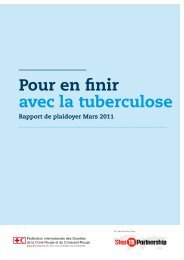Thailand - Stop TB Partnership
Thailand - Stop TB Partnership
Thailand - Stop TB Partnership
You also want an ePaper? Increase the reach of your titles
YUMPU automatically turns print PDFs into web optimized ePapers that Google loves.
Stigmatization of <strong>TB</strong> patients<br />
Even people who . . . are educated still have fears and stigmatizing<br />
attitudes. So we need to think about how to conduct prevention<br />
efficiently—how to provide information without scaring people. It is<br />
important to emphasize that <strong>TB</strong> is curable.<br />
—Rev. Sanan Wutti, The Church of Christ in <strong>Thailand</strong> 45<br />
Nongovernmental organizations report that community activists “lack academic skills” and<br />
knowledge about <strong>TB</strong> themselves, and therefore “don’t feel confident” in conducting awareness-raising<br />
efforts in their communities. 46 And where communities lack a clear understanding<br />
of how <strong>TB</strong> is spread and treated, stigmatization of persons who have <strong>TB</strong> and<br />
<strong>TB</strong>/HIV is common. Some <strong>TB</strong> patients report satisfaction both with services received in<br />
community hospitals and with levels of support from family members and neighbors. 47 But<br />
fear of stigmatization presents a significant barrier to treatment. Enhanced support for community<br />
education and stigma reduction activities could create a more enabling environment<br />
for people to access rather than avoid diagnostic and treatment services. 48<br />
Both women and men report experiencing stigmatization upon being diagnosed<br />
with <strong>TB</strong>. However, there are some indications that women are affected more severely. For<br />
example, one recent assessment carried out in Kanchaburi found that <strong>TB</strong> is perceived as<br />
a “male” disease, associated with high-risk lifestyle and behaviors such as working in an<br />
unsanitary environment, drinking, smoking, and overindulging in nightlife activities. Thus,<br />
women infected with <strong>TB</strong> are seen as being at odds with social norms and expectations of<br />
“female” behavior, intensifying the level of stigmatization they experience. 49<br />
Some community activists have warned that lack of information about the interaction<br />
between <strong>TB</strong> and HIV/AIDS is particularly severe, and noted that providing effective<br />
communication about <strong>TB</strong>/HIV without adding to stigmatization is a particular challenge. 50<br />
This makes it extremely important for the NTP and the National AIDS Control Programme<br />
to develop and disseminate materials that provide accurate and accessible information about<br />
<strong>TB</strong> as well as about the interaction between <strong>TB</strong> and HIV, including through close partnership<br />
with civil society organizations based in the most affected and high-risk communities.<br />
NGOs and community-based groups generally can and should play a more active<br />
role in mobilizing and educating the public and those at high risk of <strong>TB</strong> infection, as the<br />
experience with HIV/AIDS demonstrates. Since the 1990s, HIV/AIDS NGOs and community-based<br />
groups have played a vital role in advocating for drug and clinical trials, training<br />
health care workers, and providing outreach to marginalized populations such as injection<br />
drug users, sex workers, migrant workers, and men who have sex with men. 51 Given their<br />
record of success in communications and advocacy work in particular, HIV/AIDS NGOs<br />
44<br />
<strong>TB</strong> POLICY IN THAILAND



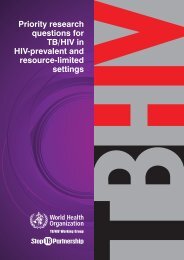

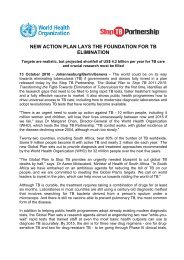

![Global Drug Facility Annual Report 2011 [.pdf] - Stop TB Partnership](https://img.yumpu.com/26788745/1/184x260/global-drug-facility-annual-report-2011-pdf-stop-tb-partnership.jpg?quality=85)

![Concept note on national stop TB partnership [.pdf]](https://img.yumpu.com/26788741/1/184x260/concept-note-on-national-stop-tb-partnership-pdf.jpg?quality=85)

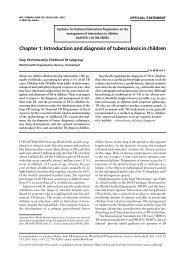
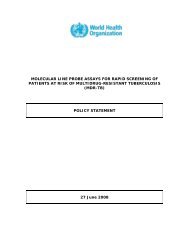
![2005 and Challenges for 2006 - 2015 [.pdf] - Stop TB Partnership](https://img.yumpu.com/26788674/1/190x245/2005-and-challenges-for-2006-2015-pdf-stop-tb-partnership.jpg?quality=85)
![Brochure (French) [.pdf] - Stop TB Partnership](https://img.yumpu.com/17234792/1/190x91/brochure-french-pdf-stop-tb-partnership.jpg?quality=85)

